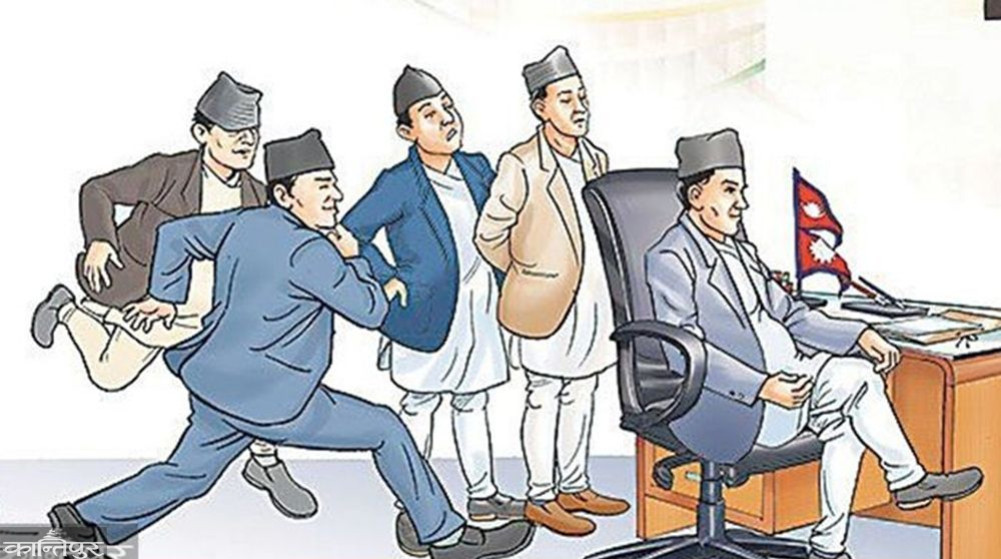"The Social Media Bill is not friendly to the digital economy"
We use Google Cloud Translation Services. Google requires we provide the following disclaimer relating to use of this service:
This service may contain translations powered by Google. Google disclaims all warranties related to the translations, expressed or implied, including any warranties of accuracy, reliability, and any implied warranties of merchantability, fitness for a particular purpose, and noninfringement.


The Asia Internet Coalition (AIC), a network of the world's leading social media and digital platform companies, has submitted a 10-page response demanding comprehensive amendments to Nepal's social media bill as it will hinder the development of the local digital economy.



16 social network companies such as Apple, Google, Meta, X, Yahoo, LinkedIn, Spotify, Amazon, Pintrest, Sapify, Snap Inc, Rakuten, Booking.com, and FedEx have expressed their continued interest and stakeholder suggestions in a letter sent by AIC. It is mentioned that the Ministry of Communication and Information Technology's disregard is a worrying and serious matter.
'If the bill to regulate the use and regulation of social media is passed in its current state, it will not be digital business friendly and will hinder the development of the flourishing digital economy in Nepal,' says the letter signed by AIC Managing Director Jeff Paine, 'Required opinions of stakeholders- When the bill was made in a hurry without collecting suggestions, it included very flawed proposals, so that technology companies, civil society and other stakeholders have been continuously objecting to the bill.'
In view of the growing digital economy of the country, policy makers should create laws to promote a business-friendly environment in Nepal. Not only that, the letter also mentions that the bill will hinder Nepal's information technology sector from bringing in vital foreign investment. Netra Prasad Subedi, joint secretary and spokesperson of the Ministry of Communications, who played an active role in drafting the bill, said that he received the AIC letter only on Monday. We received suggestions from 16 social media companies on Monday alone. Other stakeholders have also sent suggestions, work is being done to reconcile all of them," said spokesperson Subedi, "After necessary discussion and brainstorming, the issues to be included in the bill are ready to be sent to the Council of Ministers."
AIC's suggestions will be seriously considered, he said. In the letter, the social media companies expressed their major interest and explained it in detail in 11 points. AIC's letter states that it is technically and practically impossible to implement the provisions in the bill like 'prohibiting the publication or broadcasting of content that is against sovereignty, geographical integrity, social and religious harmony or incites social and religious harmony'. AIC also claims that it is unfair to give platform operators the task of checking the legality of content posted on
social networks. Therefore, it is suggested in the letter not to include the provision of active monitoring and removal of illegal content proposed in the bill. The letter states that users should be held accountable for the content, not the platform, and that the removal of content should be done in accordance with international human rights standards so that freedom of expression is not violated. Although it is mentioned in the draft
bill that users should not 'harass' or 'insult' others, there is no definition of what constitutes harassment or insult, as it is ambiguous and ambiguous, AIC believes that implementation will not be easy. Similarly, the AIC has stated that the arrangements mentioned for the social network operators, including "necessary arrangements, violation of laws, social and religious harmony, fact-checking mechanism" are unclear and unfair. The AIC concludes that these issues are contrary to the Santa Clara Principles of Content Moderation, as it is not possible to immediately fact-check posted content and determine whether it is legal or not, and it is not clear what content is considered illegal. The
letter also termed the terms that social media users had to follow as unreasonable. AIC suspects that the inclusion of topics such as 'offensive', 'false information', 'disturbing social harmony', and 'anonymous identity' in the bill without the necessary clear definition will help to suppress legitimate criticism, dissent and freedom of expression. One of the points also mentions that online freedom is stifled by placing users under the ambit of punishment based on sharing, liking or reposting. It is mentioned in the letter that there is no provision for procedures and infrastructure to ensure and protect the rights of users and companies and there is no provision for a body to file complaints.
Along with that, AIC claims that the terms of the bill are unilaterally applicable to Nepalis outside Nepal, regardless of the fact that there may be different legal arrangements in different countries. "Trying to apply a law beyond the borders of that country will not only create a situation of confusion, but it may be against global practice," the letter said. It has also suggested to limit users within Nepal and content produced in Nepal. The
letter has also raised questions about the independence and scope of the various bodies provided for in the bill. It is mentioned in the bill that the jurisdiction of the Social Media Management Council and the Social Media Management Center, which are supposed to be under the coordination of the Minister of Communication, will conflict with each other, and the jurisdiction of the agencies such as the Advertising Board, Press Council Nepal, and the Telecommunication Authority, which are already doing some work related to social media, is also unclear in the bill. Doubts have been expressed that the 'conditions', 'regulations related to the use of social media' and 'policies' determined by the agency under the Ministry of Communication will be autonomous. Instead, the letter suggests that the bill should provide for only one autonomous and responsible agency to manage social media. The
paper shows how forced localization can negatively impact the use of social media and the digital economy based on it. In a study conducted by the European Center for International Political Economy in Brazil, China, the European Union, India, Indonesia, Korea, Vietnam and other countries, it is said in the letter that the gross domestic product has been affected when those countries try to forcefully localize social media platforms. Therefore, AIC has indicated that a similar situation may occur in Nepal.
The Ministry of Communications has previously prepared and implemented the 'Guidelines for Regulating the Use of Social Networks, 080', as it is impractical and against international standards, AIC demanded to reform it, along with the Minister of Communications Rekha Sharma, Prime Minister Pushpa Kamal Dahal, the then Secretary of Communications Krishna Bahadur Raut and the Nepal Telecommunication Authority. A letter was sent to the then president Purushottam Khanal.
Requesting an in-depth discussion on these issues, the AIC also urged the government to start preparing for virtual dialogue as soon as possible, if not physically. However, the AIC expressed disappointment that despite its continuous efforts, the Ministry of Communications has so far not taken any initiative or responded to the dialogue. In addition, the companies also stated that they are ready for further discussion and meaningful dialogue regarding the issues mentioned in the letter.
 प्रकाशित : फाल्गुन १२, २०८० ०७:०७
प्रकाशित : फाल्गुन १२, २०८० ०७:०७

 २४.१२°C काठमाडौं
२४.१२°C काठमाडौं
















